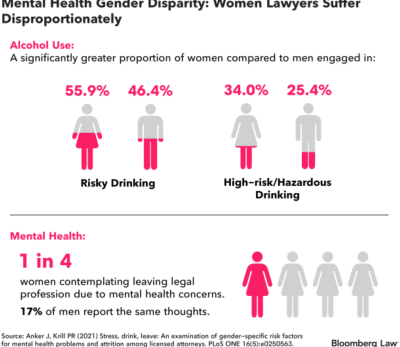New Study: Women Lawyers More Stressed, Drinking More Than Men

New Study (of nearly 3,000 US lawyers): “Stress, Drink, Leave” found levels of mental health problems and problematic drinking to be high among practicing lawyers generally.
Specifically, it found women attorneys have a higher prevalence and severity of depression, anxiety, stress, risky and hazardous drinking, and attrition compared to their male counterparts.
- Overall findings: 28% of the lawyers reported symptoms of depression; 23% maladaptive stress; 21-36% engage in hazardous drinking.

- More on alcohol: Over 80% of all the lawyers sampled reported being current drinkers (10% higher than general population); 30% screened positive for high-risk hazardous drinking; only 2% reported being diagnosed with an alcohol use disorder.
– Women attorney findings: 56% engaged in risky drinking behavior; 34% were high-risk or hazardous drinking (c.f., 46% of men engaged in risking drinking; 25% were high-risk or hazardous drinkers).
– Note: 34.6% of the women and 29.2% of the men reported that their drinking has increased during the pandemic. Women who reported an increase in drinking were seven times more likely to engage in risky drinking (men were nearly four times more likely).
– Implications: gender disparity; under-diagnosis and treatment - More on mental health:
– 5.2% of women had symptoms indicating moderately severe depression, compared with 4.2% of the men.
– 8.4% of the women and 4.5% of the men had severe anxiety.
– 37.5% of the women and 30.1% of the men reported high effort-reward imbalances. - Attrition: 25% of women contemplated leaving the profession due to mental health concerns, compared with 17% of men (note: a significantly higher proportion of male attorneys were in senior positions).
The study also looked beyond prevalence data; it looks at the predictors of those factors that have been shown to negatively impact the legal profession. Several occupational factors were found to significantly contribute to these problems. Women’s responses demonstrated a greater level of effort needed to elicit reward at work when compared with men, significantly higher levels of over-commitment and work-family conflict, and a lower likelihood of promotion
- High work over-commitment and permissiveness toward alcohol at work were associated with the highest likelihood of stress and risky drinking (relative to all other predictors) and of negative mental health outcomes.
- Women and men differed when it comes to the factors correlated with a desire to leave the profession.
– For women, work-family conflict was associated with the highest likelihood of leaving, while over-commitment was the most significant predictor of leaving for men.
– Women with a high work-family conflict score were 4.5 times more likely to leave or consider leaving law; men reporting high work over-commitment were more than twice as likely to consider leaving.
– Men who scored high on the perceived likelihood of promotion scale were 2.5 times less likely to consider leaving (there was no association between these two items for women).
“Overall, findings from the present study suggest that levels of mental health problems and problematic drinking continue to be quite high among currently employed attorneys. Women experience more mental health distress, greater levels of over-commitment and work-family conflict, and lower prospects of promotion than men in the legal profession and are more likely to leave as a result,” the article concludes.
The authors note their survey occurred during the COVID-19 pandemic–though they made efforts to assess how COVID-19 might have impacted their respondents within the survey as well as in their results overall, there are still likely unaccounted effects of the pandemic present. They also note their survey did not ask about help-seeking in respondents; however, the results still clearly indicate mental health problems, alcohol misuse, and gender disparities are significant problems in the legal profession.
CONTACT US:
If you are experiencing or are concerned about a colleague who may be struggling with mental health and/or substance use concerns, VJLAP is here to help. We are here 24/7 to help, provide information, or just listen.
Please do not hesitate to contact us (by email, phone, letter, carrier pigeon, smoke signals, etc. at www.vjlap.org; [email protected]; Office: 804.644.3212; HelpLine (24/7): 877.545.4682).
Resources:
- “Stress, Drink, Leave” report. Read now.
- “Women Lawyers More Stressed Drinking More Than Men, Study Says” (Bloomberg). Article
- “Mental health, stress have one-in-four women lawyers mulling career change (Reuters). Article.
- Webinar of the Researchers (DC Bar and California Lawyers Association). Watch now.
